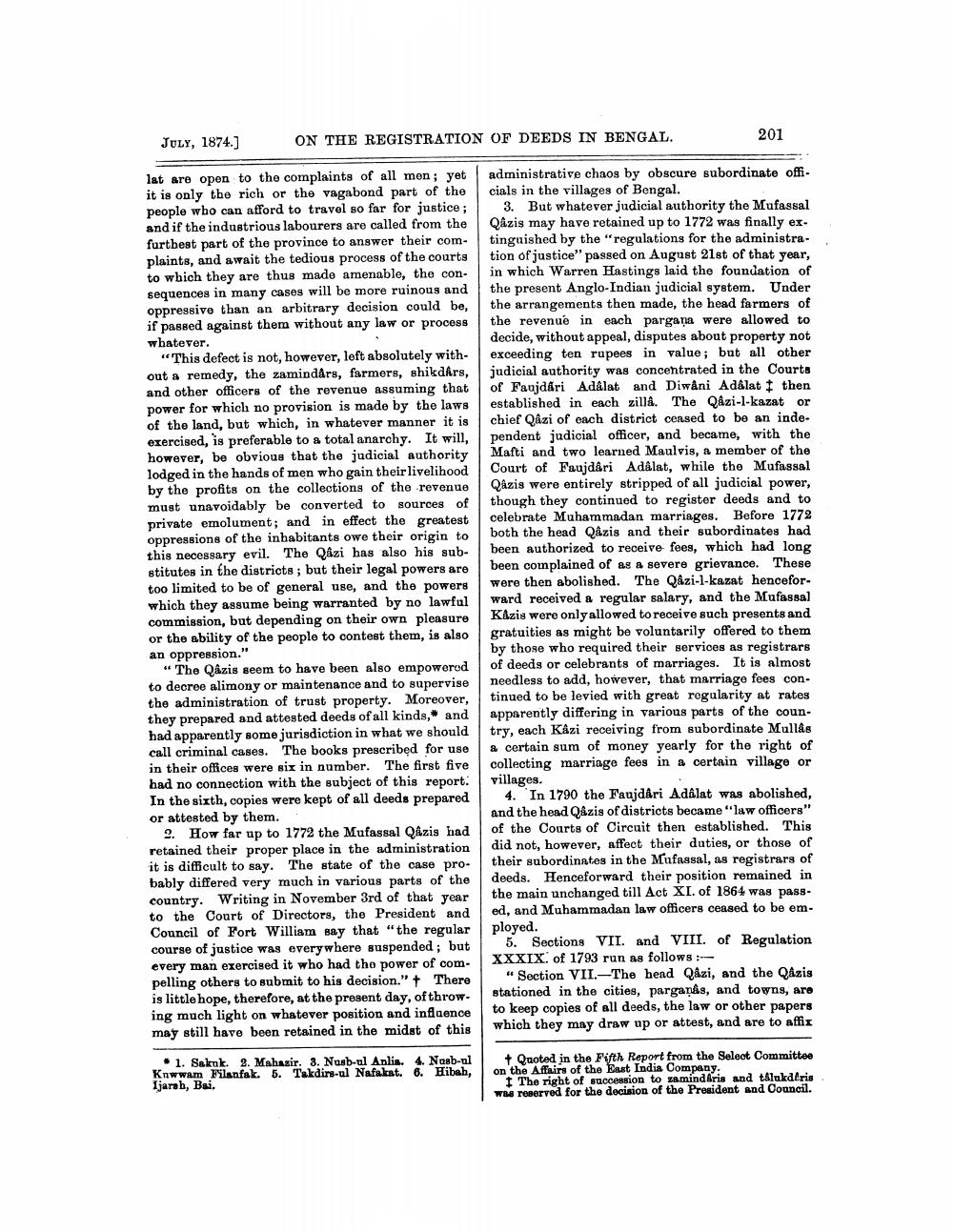________________
ON THE REGISTRATION OF DEEDS IN BENGAL.
JULY, 1874.]
lat are open to the complaints of all men; yet it is only the rich or the vagabond part of the people who can afford to travel so far for justice; and if the industrious labourers are called from the furthest part of the province to answer their complaints, and await the tedious process of the courts to which they are thus made amenable, the consequences in many cases will be more ruinous and oppressive than an arbitrary decision could be, if passed against them without any law or process whatever.
"This defect is not, however, left absolutely without a remedy, the zamindârs, farmers, shikdars, and other officers of the revenue assuming that power for which no provision is made by the laws of the land, but which, in whatever manner it is exercised, is preferable to a total anarchy. It will, however, be obvious that the judicial authority lodged in the hands of men who gain their livelihood by the profits on the collections of the revenue must unavoidably be converted to sources of private emolument; and in effect the greatest oppressions of the inhabitants owe their origin to this necessary evil. The Qâzi has also his substitutes in the districts; but their legal powers are too limited to be of general use, and the powers which they assume being warranted by no lawful commission, but depending on their own pleasure or the ability of the people to contest them, is also an oppression."
"The Qâzis seem to have been also empowered to decree alimony or maintenance and to supervise the administration of trust property. Moreover, they prepared and attested deeds of all kinds, and had apparently some jurisdiction in what we should call criminal cases. The books prescribed for use in their offices were six in number. The first five had no connection with the subject of this report. In the sixth, copies were kept of all deeds prepared or attested by them.
2. How far up to 1772 the Mufassal Qâzis had retained their proper place in the administration it is difficult to say. The state of the case probably differed very much in various parts of the country. Writing in November 3rd of that year to the Court of Directors, the President and Council of Fort William say that "the regular course of justice was everywhere suspended; but every man exercised it who had the power of compelling others to submit to his decision." There is little hope, therefore, at the present day, of throwing much light on whatever position and influence may still have been retained in the midst of this
1. Sakuk. 2. Mahazir. 3. Nusb-ul Anlia. 4. Nusb-ul Kawwam Filanfak. 5. Takdirs-ul Nafakat. 6. Hibah, Ijarah, Bai.
201
administrative chaos by obscure subordinate officials in the villages of Bengal.
3. But whatever judicial authority the Mufassal Qâzis may have retained up to 1772 was finally extinguished by the "regulations for the administration of justice" passed on August 21st of that year, in which Warren Hastings laid the foundation of the present Anglo-Indian judicial system. Under the arrangements then made, the head farmers of the revenue in each pargana were allowed to decide, without appeal, disputes about property not exceeding ten rupees in value; but all other judicial authority was concentrated in the Courts of Faujdari Adâlat and Diwâni Adalat ‡ then established in each zillâ. The Qâzi-l-kazat or chief Qazi of each district ceased to be an independent judicial officer, and became, with the Mafti and two learned Maulvis, a member of the Court of Faujdâri Adâlat, while the Mufassal Qâzis were entirely stripped of all judicial power, though they continued to register deeds and to celebrate Muhammadan marriages. Before 1772 both the head Qâzis and their subordinates had been authorized to receive fees, which had long been complained of as a severe grievance. These were then abolished. The Qâzi-l-kazat henceforward received a regular salary, and the Mufassal Kâzis were only allowed to receive such presents and gratuities as might be voluntarily offered to them by those who required their services as registrars of deeds or celebrants of marriages. It is almost needless to add, however, that marriage fees continued to be levied with great regularity at rates apparently differing in various parts of the country, each Kâzi receiving from subordinate Mullâs a certain sum of money yearly for the right of collecting marriage fees in a certain village or villages.
4. In 1790 the Faujdâri Adâlat was abolished, and the head Qâzis of districts became "law officers" of the Courts of Circuit then established. This did not, however, affect their duties, or those of their subordinates in the Mufassal, as registrars of deeds. Henceforward their position remained in the main unchanged till Act XI. of 1864 was passed, and Muhammadan law officers ceased to be employed.
5. Sections VII. and VIII. of Regulation XXXIX. of 1793 run as follows:---
"Section VII.-The head Qazi, and the Qâzis stationed in the cities, parganâs, and towns, are to keep copies of all deeds, the law or other papers which they may draw up or attest, and are to affix
+ Quoted in the Fifth Report from the Select Committee on the Affairs of the East India Company.
I The right of succession to zamindaris and talukdfris was reserved for the decision of the President and Council.




